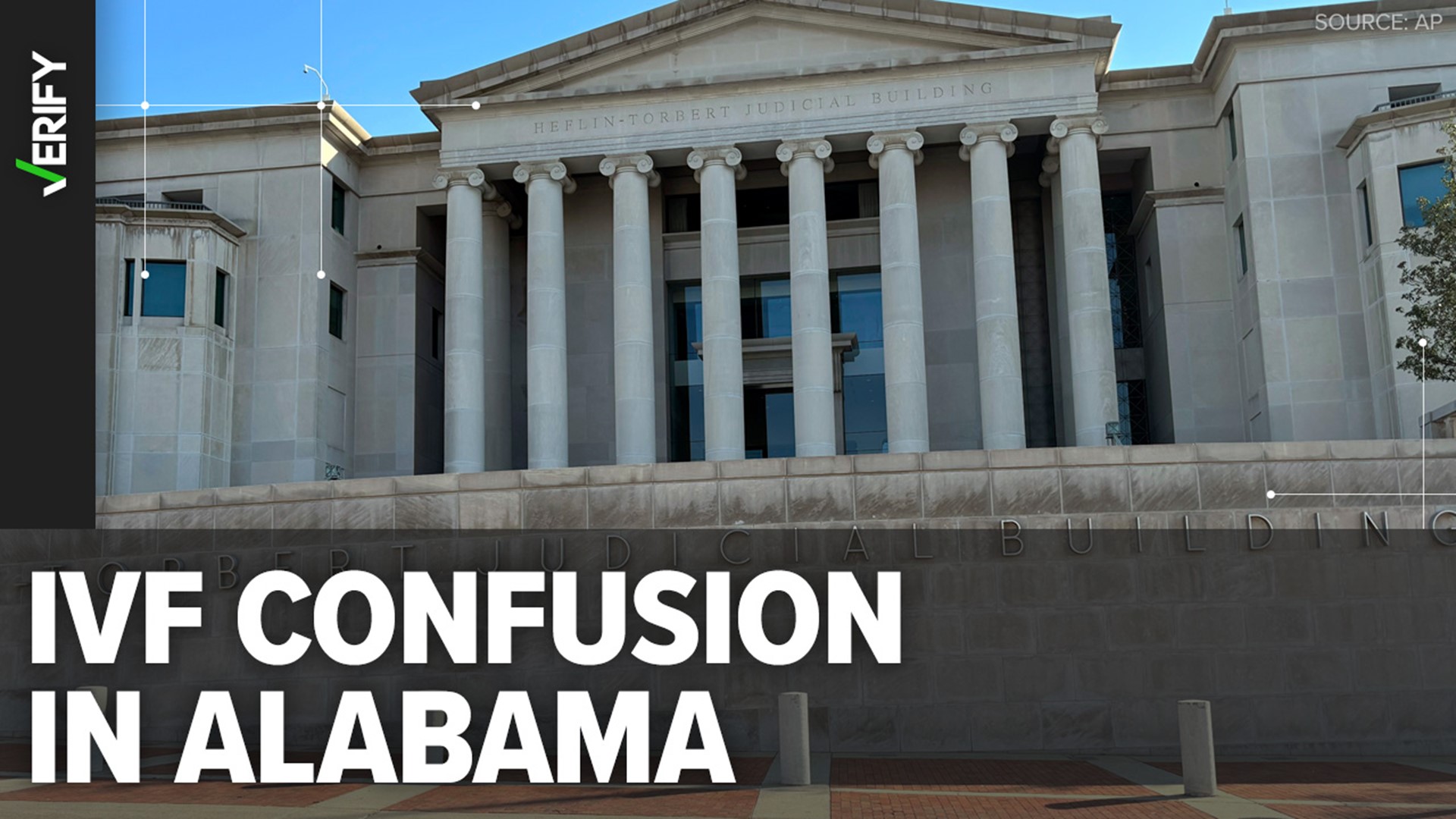UPDATE (03/08/2024): Alabama Gov. Kay Ivey signed legislation on March 6 that shields in vitro fertilization providers from potential legal liability, more than two weeks after the Alabama Supreme Court ruled that frozen embryos can be considered children under state law. Doctors from at least one clinic said they would resume providing IVF services. The story continues as originally published below:
On Feb. 16, the Alabama Supreme Court ruled that frozen embryos can be considered children under state law, prompting backlash online.
The decision was issued in a pair of wrongful death cases brought by three couples who had frozen embryos destroyed in an accident at a fertility clinic.
After the Alabama Supreme Court issued its ruling, some people online claimed it makes in vitro fertilization (IVF) illegal in the state. Others say clinics that offer IVF treatment fear they could be criminally prosecuted in the wake of the ruling.
IVF is a type of fertility treatment where eggs are collected from the ovaries and combined with sperm outside of a person’s body in a lab. The fertilized egg, which is called an embryo, is then placed inside of the uterus. The process often results in more embryos than can be transferred into the uterus in one cycle, and those extra embryos may be frozen and stored for future use.
As the situation continues to develop, we have VERIFIED answers to some of the top questions on how the Alabama Supreme Court ruling impacts IVF treatments in the state.
THE SOURCES
- Alabama Supreme Court ruling in Le Page v. Center for Reproductive Medicine
- American College of Obstetricians and Gynecologists (ACOG)
- The Fertility Providers Alliance
- Jill Lens, professor of law at the University of Arkansas and a reproductive rights expert
- Katie O’Connor, director of federal abortion policy at the National Women’s Law Center
- Center for Reproductive Rights
- Spokesperson for the University of Alabama at Birmingham
- Alabama Fertility Specialists, a fertility clinic in the state
- Mobile Infirmary in Alabama
WHAT WE FOUND
1. Does the Alabama Supreme Court ruling make IVF illegal in the state?
THE ANSWER
The Supreme Court ruling itself also does not say it makes in vitro fertilization (IVF) treatment illegal.
University of Arkansas law professor and reproductive rights expert Jill Lens and Katie O’Connor, director of federal abortion policy at the National Women’s Law Center, also told VERIFY the ruling does not outlaw IVF in Alabama.
But many of our sources, including the American College of Obstetricians and Gynecologists (ACOG), say the decision jeopardizes access to IVF treatment.
“The Alabama Supreme Court’s decision in LePage v. Mobile Infirmary Clinic will severely limit or effectively remove access to in vitro fertilization from the people of Alabama, unjustly and unfairly denying them the ability to build their families through a critical, effective fertility intervention that represents one of the most significant medical advances of the last century,” the ACOG said in a statement.
O’Connor shared a similar sentiment.
“While this ruling does not definitively make the practice of IVF illegal in Alabama, it contributes to a climate of uncertainty among doctors and patients and will inevitably lead many or all providers to stop providing this care in Alabama for fear of legal consequences,” she said.
The Fertility Providers Alliance, an organization established by providers of reproductive medicine, also said “potential liability for negligence and the need for heightened security measures could significantly inflate treatment costs, potentially placing IVF out of reach for many families.”
2. Have any Alabama clinics paused IVF treatment after the ruling?
THE ANSWER
At least three clinics in Alabama have announced they are pausing IVF treatment after the state Supreme Court ruling.
The University of Alabama at Birmingham’s Division of Reproductive Endocrinology and Infertility has paused IVF treatments “as it evaluates the Alabama Supreme Court’s decision that a cryopreserved embryo is a human being,” a spokesperson for the university said.
“We are saddened that this will impact our patients’ attempt to have a baby through IVF, but we must evaluate the potential that our patients and our physicians could be prosecuted criminally or face punitive damages for following the standard of care for IVF treatments,” the spokesperson said in a statement.
Egg retrieval services still remain in place at UAB, but egg fertilization and embryo development are paused, they added.
Alabama Fertility Specialists, another clinic in the state, said in a statement on Facebook that it will “hold new IVF treatments due to the legal risk” to its clinic and embryologists.
“We are contacting patients that will be affected today to find solutions for them and we are working as hard as we can to alert our legislators as to the far reaching negative impact of this ruling on the women of Alabama,” the clinic said.
The Center for Reproductive Medicine at Mobile Infirmary in Alabama, which is named in the lawsuit over destroyed frozen embryos, is also pausing IVF treatments to prepare embryos for transfer effective Feb. 24, 2024.
IVF providers in Alabama may stop offering treatment altogether, the Center for Reproductive Rights spokesperson said. They added that “it’s unclear what the decision means for families who currently have embryos stored at IVF clinics” in the state.
3. Does the Alabama Supreme Court ruling impose criminal penalties?
THE ANSWER
The state Supreme Court ruling is focused on an Alabama law that imposes civil penalties – not criminal, a spokesperson for the Center for Reproductive Rights said.
Lens told VERIFY the Alabama ruling “doesn’t say anything about criminal consequences.”
Alabama Attorney General Steve Marshall also “has no intention of using” the Supreme Court decision “as a basis for prosecuting IVF families or providers,” his chief counsel Katherine Robertson said in a statement.
In the 7-2 ruling, the Alabama Supreme Court said an 1872 state law called the Wrongful Death of a Minor Act allowing parents to sue over the death of a minor child “applies to all unborn children, regardless of their location,” including those who are “located outside of a biological uterus at the time they are killed.”
The Center for Reproductive Rights spokesperson said that “based on the ruling, anyone who discards or destroys an embryo, even accidentally, could be liable under the law.”
“Many standard processes involved in IVF could jeopardize embryos and result in civil liability, including thawing cryopreserved embryos, genetically testing embryos, and transferring embryos to attempt to achieve pregnancy,” the spokesperson said.
In the only full dissent to the majority opinion, Justice Greg Cook warned of potential consequences of the decision.
“No rational medical provider would continue to provide services for creating and maintaining frozen embryos knowing that they must continue to maintain such frozen embryos forever or risk the penalty of a Wrongful Death Act claim for punitive damages,” Cook wrote.
It’s common to discard unused embryos during IVF treatment, but “patients and doctors can’t do that if embryos are considered children,” the Center for Reproductive Rights spokesperson said.
While the ruling that embryos are considered children only applies to the state’s wrongful death statute, “it’s unclear how that logic might be extended in the future to apply to other criminal laws,” the Center for Reproductive Rights said.












